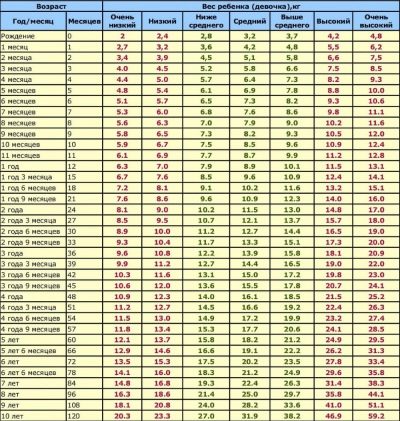Doctor Komarovsky about child weight
Body weight is an important criterion for the development of the baby. Weight at birth is included in the compulsory primary system for assessing the state of the baby - Apgar scale. The way a child gains weight after birth is important for determining its overall condition, which is why at each admission at the pediatrician the crumb is weighed.
In this article we will talk about the age norms of weight, and also give the opinion of the famous pediatrician Yevgeny Komarovsky about what to do if the child has extra weight or he does not gain the necessary weight.
About norms
All children are individual, this also applies to weight. Some are born large, other newborns, born on the same term, weigh less and there is nothing unusual in this, because their parents are different (big and thin, high or low). Weight at birth plays a big role for premature babies, according to it, as well as the exact gestational age, determine the degree of prematurity.
Normal weight for a full-term baby is on average 2.6-4 kilograms. The range of normal values is quite wide.
After birth, the gain will be monitored monthly for up to a year.
In contrast to height, which is a more stable indicator of the correctness of a baby’s development, his body weight may be more labile: his weight decreases or rises under the influence of various causes. Even within one day, according to Komarovsky, parents can see different values on the scales.
Calculate the rate of Komarovsky recommends the following formulas:
- if the child is not a year old, then his weight is m + 800n, where m is the mass at birth, and n is the age in months;
- if the child already has a year and up to the age of ten, use another formula in which the body weight is normally equal to 10 + 2n, where n is the age in years;
- if a child is older than 10 years, then for calculation use the formula in which the normal weight is 30 + 4 * (n-10), where n is the age in years.
Thus, it is easy to understand that a baby at 7 months old, if he was born with a weight of 3,500 grams, should weigh no less than 3,500+ 800x7, that is, 9 kilograms 100 grams. A child of 2 years weighs 10 + 2x2, that is, 14 kilograms. Just substitute your values and be able to focus on the norm.
You can make it easier and use the table of correspondence height and weight, depending on age. Pediatricians use these tables at the reception, because it significantly reduces the time of the child's admission, because the doctor does not need to do mathematical calculations.
Naturally, with a significant excess of the norm and in situations where the child is not gaining weight well, you need to carefully consider and eliminate the possible reasons why this happens.
Reasons for the backlog
The most active weight gain is in the first six months of a child’s life, then the pace slows down, because the child’s physical activity increases - he learns crawl, sit, and it requires high energy costs. Low-weighted children sometimes gain weight more actively than the crumbs that were born to the heroes, the increase in such babies can be more intense.
A strong backlog of real body weight from the norms can be the result of malnutrition and malnutrition, diseases of the gastrointestinal tract, as well as any other congenital or acquired diseases.
Naturally, the pediatrician will be engaged in identifying the causes, prescribe tests, will give recommendations on the diet.
If a child is a little behind the norm in weight, but he is active, agile, inquisitive, he feels fine and has normal tests, nothing to worry about, says Komarovsky. It is dangerous if the small increase and the backlog from the standards are accompanied by pallor, lethargy, some other symptoms that lead parents to think about a possible illness, it is important to immediately go to the doctor, says Yevgeny Komarovsky.
Parents' complaints that a child has a big belly at 2 years and weighs 10 kg at the same time, and that the child weighs only 8 kilograms instead of 10 in his year, should be considered in each case taking into account the full history. The doctor needs to know with what weight the child was born, how he feels in everyday life, and also to see what kind of build parents have.
It is quite clear that a sharp decrease in body weight can be a sign of quite serious diseases, and widespread helminthic invasions, and therefore it is indispensable without laboratory diagnosis in this case.
Parents of little ones who eat little by little and not every time, Komarovsky advises to calm down and stop trying at any price to fatten the child to the age limit. The approach is the same: if it feels normal and healthy, then nothing should be done for the amendment.
Why does excess occur?
Excess weight gain is most often due to the fact that the parents overfeed the baby. Excess weight is formed when the energy consumption does not correspond to the amount of food received. An infant baby who sleeps most of the day gains weight better and faster than an active and moving two-year-old.
Weight fluctuations in a greater (or smaller) direction are possible with intensive hormonal changes, for example, as a teenager loses weight or gets better during puberty. Some pathologies of the thyroid gland and other endocrine disorders can cause childhood obesity, but this happens much less frequently than the banal and widespread overfeeding of a loved one.
A child older than 2 years may suffer from overweight due to a sedentary lifestyle and low activity, the risk of gaining extra pounds is higher in children who are allowed to eat and drink harmful, but very tasty fast food, lemonade, chips.
What to do? Show the child to the doctor if necessary, examine him, do blood tests, check the work of the gastrointestinal tract and get recommendations for a smooth and accurate weight loss.
An adequate increase in physical activity, along with the discontinuation of feeding through force, usually helps well. Yevgeny Komarovsky advises giving food to a child only when he himself asks for it.
You can not feed the child in front of the TV screen: being carried away by the picture, he eats more of what he is supposed to.
Also, parents should pay attention to their own eating habits, usually the wrong diet - this is a family one. Fatty foods should disappear from the child’s diet. fried products, smoked foods, spicy, fast food, plenty of sweet. Instead, vegetables and fruits should come, steamed, boiled and baked meat and fish. It is necessary to abandon lemonade and various store sweets.
Why is it important to monitor the weight of the child? Excessive weight is dangerous at the stage of the beginning of walking, because it creates increased stress on the bones, joints, cartilage, ligaments and spine. Overweight children are more likely to register later in life. flat feet. Obesity is a fertile ground for the development of various diseases, as well as a factor in reducing immunity.
For more information about the norms of weight, see the following transfer of Dr. Komarovsky.























